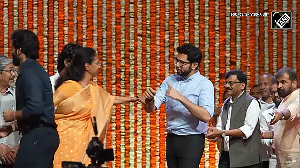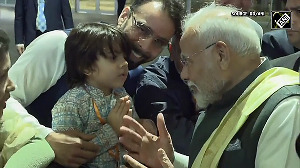Andrew Denby took over as the chief executive officer, supermarkets, of Aditya Birla Retail Ltd six months ago. Before joining the Aditya Birla group, he had worked for retail majors like Marks & Spencer, Dairy Farm, A S Watson, et cetera.
He has travelled across India studying the Indian market and trying to make the supermarket brand 'more.' a success.
'more.' has 302 supermarkets all over India right now. It includes 251 in the southern part of India after the Birla group acquired the Trinetra retail chain. The target for 'more.' is 600 retail stores by March 2008. The group has earmarked about Rs 8,000 -- 9,000 crore (Rs 80-Rs 90 billion) for its retail operations over the next few years.
Andrew Denby was in Chennai as a delegate to participate in the Foodpro conference organised jointly by the Confederation of Indian Industry and the Ministry of Food Processing Industries, Government of India and the Government of Tamil Nadu.
He talked on consumers and retail.
After his presentation, he spoke to Contibuting Editor Shobha Warrier on the growing retail sector in India.
When you were offered the post of CEO, Supermarkets, by the Aditya Birla Retail Ltd, did you know what had happened to the Reliance Retail stores in many parts of India?
At that time, I did not know anything about what happened to Reliance Retail.
Were you scared when you came to know about it?
It is always scary when something like that happens, especially if the target is your key competitor. However, life must go on. India is surging ahead in modernisation and the consumer is demanding more day by day.
Do you foresee similar problems for 'more.'?
We hope people would understand the 'more.' brand. We hope they keep in mind the Birla reputation. We deal directly with the farmers and give them an opportunity to sell their products at a good price. We are also providing employment to many. To the consumers, we are giving good quality products. People, therefore, can trust us. In India, trust is the key word.
You have worked in many developed countries, including the UK. Why did you accept the offer from the Aditya Birla group? Do you feel working in an emerging market like India is a challenge?
I look at it as a challenge. I also look at it as the most exciting opportunity.
Why is it an exciting opportunity?
The Indian retail market is untapped. There is so much opportunity here. To me, Indian consumers are smarter than the consumers in countries I have worked in.
By smarter, I mean they are much more price-savvy. Same is the case in Indonesia.
Indian women like to bargain every time they go to shop. Bargaining does not mean trying to get things cheap. It means getting better value for money. It is interesting to see the level of acceptance of suppliers' promotions in India. For example, if you sell a 1.5 litre of Pepsi with a packet of free potato chips, the volume increase is maximum. People in India like promotions.
What have you learnt about the Indian market in the last six months?
Indian housewives are different from housewives in the rest of the world except that they spend more time on checking each product they buy.
You said in your presentation that Indian women take thrice the time that British women take to shop. Why is it so?
That is because they take a long look at the labels. They don't trust that the retailer will sell fresh products. They want to know whether the shop is selling at the maximum retail price or below the MRP.
I think women all over the world prefer watching television or looking after their family to trudging the supermarkets. I want Indian women too to feel the same way. Because if they spend too much time at the supermarkets, it is a waste of energy. I want to gain their trust. I want to tell them that what we sell are quality products and that they need not spend extra time in our stores.
If we run modern looking shops run by modern operating systems, right back up, right policies and right procedures, we need not worry.
Would you say housewives shop more than anyone else in the family?
Yes. More than 70 per cent of the people that go to supermarkets early in the morning from Monday to Friday, are women. They shop to meet their daily needs -- mainly fruits, vegetables, bread, etc. But of the families that shop in the weekends, the male female ratio is 50:50.
Are women your target customers?
Yes. Women between 18 and 50, who are looking for a comfortable and convenient shopping ambience, throng the supermarkets.
How do you describe the Indian retail market?
Indian market is complex because the product range here is more focussed on staples. The latter again vary from state to state. For example, toor dal soaked in oil cannot be found anywhere but in Gujarat. What is popular in Delhi may not be that popular in Mumbai.
The success of a retailer lies in how he gives each shop the local flavour. Needs of the people in Punjab would be different from those living in Tamil Nadu.
It is the size of India that makes its retail market so unique.
How much do you expect the Indian retail market to grow?
We have tapped just the tip of the iceberg. It is three and a half per cent as we speak. The analysts say it could be 10 per cent in 10 years. I think it is a very realistic target. I am looking to be in the forefront as the industry grows from strength to strength.
What is your take on mom and pop store owners and roadside vendors whose lives are getting affected because of the supermarkets?
To me it is a blue ocean strategy. With growth in population and growth in urbanisation, there should be very few individuals whose livelihood would be at risk. With more people coming in with an increased disposable income, there will never be dearth of people going to the kirana stores for their daily needs.
When Reliance Retail stores opened, it were these people who got affected. In India, the divide between the haves and the have nots is still huge
I would say there is room enough for everybody right now. Do I feel sorry for them? Yes, I feel sorry for anybody who is going to end up without a job. But for the next 10 years at least, there should be room for everybody.
Are you enjoying working in India?
Let me use the McDonald's phrase, ' I am loving it!' It is a challenge working in India. It's a wonderful opportunity to travel across the country every week. I have probably been to more cities than most Indians have. The aspiration and optimism that run through the veins of India are stronger than that in any other country.
Photograph: Sreeram Selvaraj






